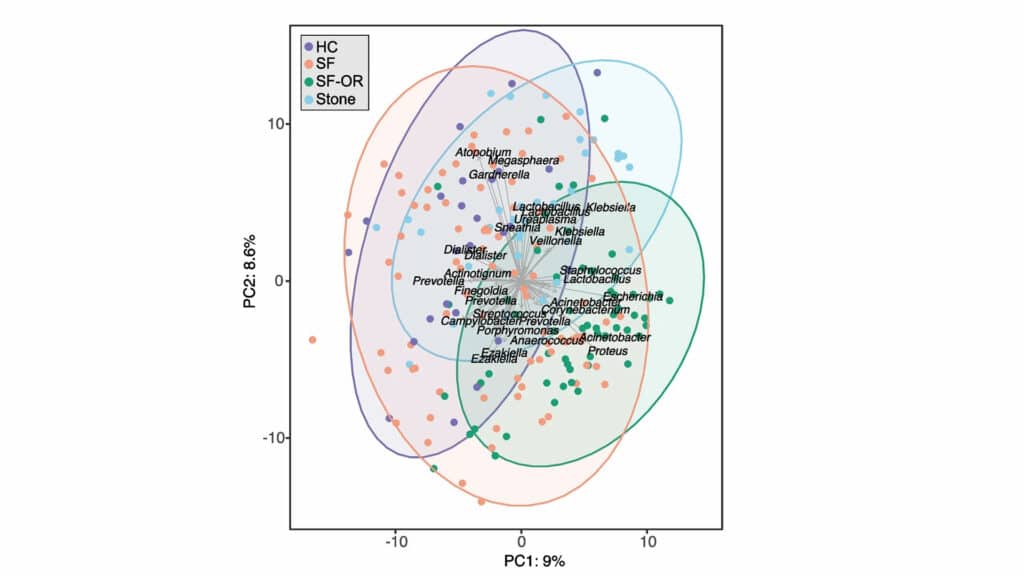A recent study by Lawson Health Research Institute and Western University, published in the journal Microbiome, discovered that changes in the body’s microorganisms, known as the Microbiome, are connected to kidney stone formation.
The human Microbiome consists of many microorganisms, including beneficial bacteria. Recent research has revealed its impact on health and various diseases.
In this study, the researchers looked at the gut, urine, and saliva microbiomes of 83 patients with kidney stones, comparing them to 30 healthy individuals. They found that alterations in all three microbiomes were associated with the formation of kidney stones.

Dr. Jeremy Burton, Lawson Scientist and Research Chair of Human Microbiome and Probiotics at St. Joseph’s Health Care London (St. Joseph’s), said, “Kidney stone disease has been rising in recent years, affecting roughly 10 percent of people.While previous research has shown a connection between the gut microbiome and kidney stones in those who have taken antibiotics, we also wanted to explore the connection to other microbiomes in the hopes we can advance understanding and potential treatments.”
The study included individuals who had developed kidney stones, hadn’t taken antibiotics in the past 90 days, and were undergoing surgical removal of the stones at St. Joseph’s.
Dr. Kait Al, lead author on the study and Postdoctoral Research Fellow at Western’s Schulich School of Medicine & Dentistry, said, “Our testing – called shotgun metagenomic sequencing – allowed us to discover which bacteria were present in the gut and the genetic capabilities of those bacteria, or how it functions. We also did a simpler sequencing of the oral and urinary samples.”
Kidney stones are usually made of calcium oxalate, a byproduct produced by the body. Traditionally, it was believed that people with specific gut microbes, like Oxalobacter formigenes, were less likely to get kidney stones because they break down oxalate. However, this study suggests that other factors are involved.
The story is more complicated. In healthy people, the microbes create a stable and beneficial network. But in those with kidney stones, this network breaks down. They don’t produce the same vitamins and valuable substances, not just in the gut but also in the urinary tract and mouth, as explained by Dr. Al.
People with kidney stones showed evidence of more exposure to antimicrobials, resulting in higher levels of antibiotic-resistant genes. Dr. Burton, an Associate Professor, noted that those with kidney stones had an unhealthy microbiome, which could excrete toxins to the kidneys and were antibiotic-resistant.
While more research is necessary, these initial findings highlight the significance of maintaining a healthy microbiome through a diet that supports it and minimizing antibiotic use. The study received partial funding from the Weston Foundation and was supported by the American Urological Association.
In conclusion, a recent study uncovered a link between the Microbiome and kidney stones. Researchers found that changes in the body’s microorganisms, particularly in the gut, urinary tract, and saliva, are associated with the formation of kidney stones.
The study also revealed that those with kidney stones had an unhealthy microbiome and were more antibiotic-resistant. While more research is needed, maintaining a healthy microbiome through a balanced diet and limiting antibiotic use could prevent kidney stones and support overall health.
Journal reference:
Al, K.F., Joris, B.R., Daisley, B.A. et al. Multi-site microbiota alteration is a hallmark of kidney stone formation. Microbiome. DOI: 10.1186/s40168-023-01703-x.
>>> Read full article>>>
Copyright for syndicated content belongs to the linked Source : Tech Explorist – https://www.techexplorist.com/new-study-links-microbiome-kidney-stones/79125/










